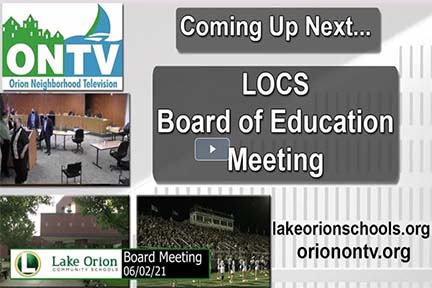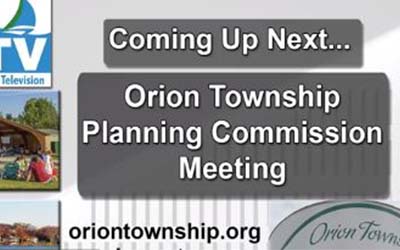
Lake Orion Community Schools Board Meeting of June 2, 2021



|

FOR IMMEDIATE RELEASE June 3, 2021 Contact: press@michigan.gov
Governor Whitmer Signs Bipartisan Bill to Expand Tasting Rooms, Supporting Michigan’s Microbreweries and Craft Distilleries
LANSING, Mich. — Today, Governor Whitmer signed Senate Bill 49, which will enable small distil
“Michigan is home to some of the best microbreweries and craft distillers in the country, and this bill make it easier for these businesses to create and operate tasting rooms,” said Governor Whitmer. “I’m proud that this bipartisan bil
“Michigan is renowned for its craft beverage industry, contributing billions to our state’s economy and employing tens of thousands of hardworking men and women, including many in our state’s great southwest region,” said Sen. Kim LaSata, R-Coloma, who sponsored Senate Bill 49. “At this critical time when our state is getting back to work and with tourism on the rebound, ensuring our craft beverage producers have the ability to both sample and sell all of their creations in the same place is a simple, yet incredibly important fix to state law. I appreciate the strong bipartisan support this bill received to help this growing industry.”
“We are grateful for this legislation that will allow us to expand services to our customers after a very difficult year,” said David Ringler, Director of Happiness Cedar Springs Brewing Company. “As a destination location in a small town it is key for us to be able to serve all of our product lines to our guests.”
The bill would amend the Michigan Liquor Control Code to allow a person to hold an on-premises tasting room permit and an off-premises tasting room license in conjunction at the same location under certain conditions.
This bill was sponsored by Sen. Kim LaSata, R-Coloma., and a copy of SB 49 can be found here. |


FOR IMMEDIATE RELEASE
June 3, 2021 Media Contact: Press@Michigan.gov
Governor Whitmer Announces Michigan Economic Jumpstart Plan The economic jumpstart plan will put Michigan back to work with better jobs and bigger paychecks.
LANSING, Mich. — Governor Gretchen Whitmer today joined local entrepreneurs and business leaders to unveil the Michigan Economic Jumpstart Plan, which would allocate a portion of the federal relief funding to support and invest in working people and small businesses in Michigan. Under the governor’s plan, the state will increase incentives to boost wages to attract applicants, provide grants to small businesses to ramp up hiring, and expand access to childcare for families with young children who want to return to work but cannot.
“As we continue to take steps to jumpstart our economy, we need to have a real conversation about putting Michigan back to work with better jobs and bigger paychecks,” Governor Whitmer said. “Under the Michigan Economic Jumpstart plan, we can harness these once-in-a-lifetime economic opportunities and channel it to raise wages, invest in small businesses, and uplift families. I look forward to engaging the legislature, local communities, and Michiganders as we continue thinking through the best ways to use the federal funds and state surplus to turbocharge our economy and make a real difference in people’s lives.”
With more than $2 billion remaining in Coronavirus Response and Relief Supplemental Appropriations Act funding, nearly $20 billion in total funding from the American Rescue Plan, the state is in a very strong position to make large investments that can transform the state and help Michigan families and small businesses recover from the pandemic.
“The combination the federal stimulus plan and the improving public health situation have set the stage for robust growth in Michigan,” State Treasurer Rachael Eubanks said. “The Governor’s plan will jumpstart the economy by providing the support that small businesses need to recover and grow and by helping parents find the child care they need to get back to work.”
In just a year, Michigan has gone from a nearly $3 billion deficit to a $3.5 billion surplus, with a state budget that is primed for investment.
“Small business owners have been anchors of hope and support during covid,” said Milinda Ysasi, CEO of Grand Rapids Opportunities for Women. “As we work to restart our Michigan economy, it is important to center the lessons and lived experiences of our entrepreneurs. The success of small business owners is critical to an equitable and better normal.”
“With 41% of Black businesses closing during the pandemic, it’s important now more than ever that we look at how we can not just restart the economy but reimagine the economy to be one that is equitable for everyone,” said Alita Kelly, Founder of South East Market and Vice Chair, City of Grand Rapids Urban Agriculture Committee. “We can take this as an opportunity to be agile to incorporate diversity and sustainability into the core of how Michigan operates business. COVID required a lot of us to think on our feet in ways unimaginable but moving forward we can better prepare ourselves to be resilient in the face of the uncertainties that are sure to surface in our future.”
Last month, the U.S. Department of Labor released state and national unemployment figures. Michigan’s unemployment rate decreased to 4.9%, beating the national average of 6.1%.
GOVERNOR WHITMER’S ECONOMIC JUMPSTART PLAN
— BETTER PAYCHECKS —
Governor Whitmer put forward the MI Bigger Paychecks proposal and reinforced the need for postsecondary opportunities, like the Michigan Reconnect and Futures For Frontliners program. By bumping pay and increasing educational and skills opportunities for workers, the state can entice more people to get back into the workforce and increase our labor force participation rate.
— SMALL BUSINESSES —
Governor Whitmer unveiled the Michigan Mainstreet Initiative, a $300 million investment to uplift small businesses. The plan would include $100 million towards restaurants and other place-based businesses to help them cover costs and meet payroll; $125 million for small businesses left out of other incentives and organizations that support them; and $75 million in grants for startups.
Lastly, Governor Whitmer is proposing expanding Michigan’s Work Share and hiring a surge of Unemployment Insurance Agency staff to help Michiganders fulfill their work search requirements. The Work Share program, which was a tool used by employers to avoid laying off workers, can be used by businesses to bring on new employees to help them restart. During the pandemic, Michigan’s work share program saved nearly 100,000 jobs. As the waiver on work search requirements for unemployment benefit recipients expires, Governor Whitmer is proposing hiring an additional 50 full-time staff to meet the expected surge in demand and help Michiganders fulfill their work search requirements.
— CHILD CARE —
In her executive budget recommendation, Governor Whitmer proposed a $370 million investment to expand access to no-cost or low-cost childcare for 150,000 more families. Right now, Michigan needs talent, and regardless of whether a child is 12 months or 12 years old, working parents can’t work without safe, quality, affordable child care. The governor’s plan would temporarily increase the income eligibility threshold from 150% to 200% of the federal poverty line, waive out-of-pocket copays through fiscal year 2022, and provide a 10 percent increase in hourly rates for child-care providers. |